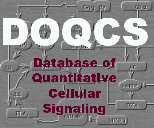
|
Enter a Search String | | Special character and space not allowed in the query term.
Search string should be at least 2 characters long. |
Molecule Parameter List for APC | The statistics table lists the distribution of a molecule acting either as a substrate, product, enzyme or as a molecule within the network.
The text color of a molecule is highlighted by  color. color. | | Statistics |
Accession and Pathway Details | |
| Accession Name | Accession No. | Accession Type | Pathway Link | MAPK_network_
2003 | 50 | Network |
Shared_Object_MAPK_network_2003, PKC, PLA2,
PLCbeta, Gq, MAPK,
Ras, EGFR, Sos,
PLC_g, CaMKII, CaM,
PP1, PP2B, PKA,
AC | | This is a network model of many pathways present at the neuronal synapse. The network has properties of temporal tuning as well as steady-state computational properties. In its default form the network is bistable.Bhalla US Biophys J. 2004 Aug;87(2):745-53 |
APC acting as a Molecule in MAPK_network_2003 Network
| Name | Accession Name | Pathway Name | Initial Conc.
(uM) | Volume
(fL) | Buffered | | APC | MAPK_network_
2003
Accession No. : 50 | PLA2
Pathway No. : 208 | 30 | 1000 | Yes | | arachodonylphosphatidylcholine is the favoured substrate from Wijkander and Sundler, JBC 202 pp 873-880, 1991. Their assay used 30 uM substrate, which is what the kinetics in this model are based on. For the later model we should locate a more realistic value for APC. |
APC acting as a Substrate for an Enzyme in MAPK_network_2003 Network
| | Enzyme Molecule /
Enzyme Activity | Accession Name | Pathway Name | Km (uM) | kcat (s^-1) | Ratio | Enzyme Type | Reagents | | 1 | PLA2-Ca* /
kenz | MAPK_network_
2003
Accession No. : 50 | PLA2
Pathway No. : 208 | 20 | 5.4 | 4 | explicit E-S complex | Substrate
APC
Product
AA
| | | 10 x raise oct22 12 x oct 24, set k2 = 4 * k3 | | 2 | PIP2-PLA2* /
kenz | MAPK_network_
2003
Accession No. : 50 | PLA2
Pathway No. : 208 | 20 | 11.04 | 4 | explicit E-S complex | Substrate
APC
Product
AA
| | | 10 X raise oct 22 12 X further raise oct 24 to allow for correct conc of enzyme | | 3 | PIP2-Ca-PLA2* /
kenz | MAPK_network_
2003
Accession No. : 50 | PLA2
Pathway No. : 208 | 20 | 36 | 4 | explicit E-S complex | Substrate
APC
Product
AA
| | | 10 x raise oct 22 12 x and rescale for k2 = 4 * k3 convention oct 24 Increase further to get the match to expt, which was spoilt due to large accumulation of PLA2 in the enzyme complexed forms. Lets raise k3, leaving the others at k1 = 1.5e-5 and k2 = 144 since they are large already. | | 4 | DAG-Ca-PLA2* /
kenz | MAPK_network_
2003
Accession No. : 50 | PLA2
Pathway No. : 208 | 20 | 60 | 4 | explicit E-S complex | Substrate
APC
Product
AA
| | | 10 X raise oct 22 12 X raise oct 24 + conversion to k2 =4 * k3 | | 5 | PLA2*-Ca /
kenz | MAPK_network_
2003
Accession No. : 50 | PLA2
Pathway No. : 208 | 20 | 120 | 4 | explicit E-S complex | Substrate
APC
Product
AA
| | | This form should be 3 to 6 times as fast as the Ca-only form. I have scaled by 4x which seems to give a 5x rise. 10x raise Oct 22 12 x oct 24, changed k2 = 4 * k3 |
APC acting as a Product in a reaction in MAPK_network_2003 Network
| Kd is calculated only for second order reactions, like nA+nB <->nC or nA<->nC+nD, where n is number and A,B,C,D are molecules, where as for first order reactions Keq is calculated.
Kd for higher order reaction are not consider. |
| Name | Accession Name | Pathway Name | Kf | Kb | Kd | tau | Reagents | | Degrade-AA | MAPK_network_
2003
Accession No. : 50 | PLA2
Pathway No. : 208 | 0.4
(s^-1) | 0
(s^-1) | - | - | Substrate
AA
Product
APC
| | I need to check if the AA degradation pathway really leads back to APC. Anyway, it is a convenient buffered pool to dump it back into. For the purposes of the full model we use a rate of degradation of 0.2/sec Raised decay to 0.4 : see PLA35.g notes for Feb17 |
| Database compilation and code copyright (C) 2022, Upinder S. Bhalla and NCBS/TIFR
This Copyright is applied to ensure that the contents of this database remain freely available. Please see FAQ for details. |
|
